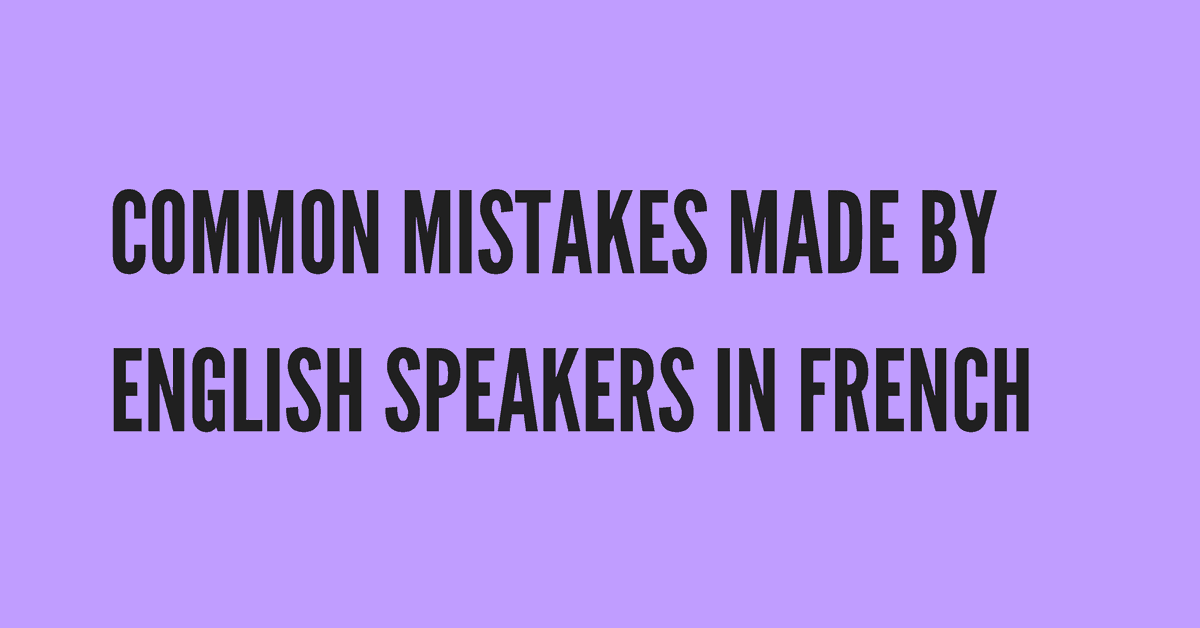French and English have some vocabulary in common and share grammatical similarities, but they are undoubtedly different languages. So it is quite normal for French speakers to make mistakes in English and vice versa.
Do you chuckle whenever you hear a French native pronounce English words without an “h”, or when they add an “s” after an adjective to mark the plural?
Ok, you're so correct in your language, but do remember the French proverb "rira bien qui rira le dernier" (he who laughs last laughs longest). If you really want to be "the one who laughs last", be careful to not make mistakes when it's your turn to speak French.
Perhaps reading this article is a good start.

1. The verb 'manquer'
This is a confusing but also interesting verb. Some of you are starting to say "What's confusing about this verb, isn't that a simple 1st group verb?". Ok, you're right, but I'm not talking about the conjugation. Knowing that the usual translation of "manquer" is "miss", let's translate this sentence:
- I miss you.
If you are doing a word-by-word translation, you will have:
"I" = "Je", "miss" = "manquer", "you" = "tu" -> "Je temanque". Sounds correct, no? Unfortunately, the answer is "NO", the order is wrong.
The right sentence should be Tu me manques.
Contrary to English, in French, the one who is missed is the subject, and the one who misses (the other one) is the object. Actually the construction is "A manques à B" / "A is missing to B".
But in short, all you need to remember is that when you are missing someone else, he/she is probably more important than you, so he/she should be the subject, and not you .
2. Contraction with 'h' muet."
You probably know about the contraction of some words in French before a vowel. For example:
- je ai -> j'ai
- le aspect -> l'aspect
You also know that the "h" in French is not pronounced. For example "hiver" (winter) is pronounced "iver"
But, whether the "h" acts as a vowel or a consonant, or in other words, whether you have to use a contraction before a word starting with an "h" is not a simple problem for foreigners learning French. Actually both cases could be true:
- In French, the "h" at the beginning of some words acts as a vowel, meaning you need to use contraction with those words.
Example:
l'hiver winter
l'hébergement lodging
l'herbe grass
l'heure hour
Sometimes the "h", usually in words that are borrowed from other languages, acts as a consonant, so you cannot use contraction with those words. These are called "h aspiré" (aspired h). Some examples are given below:
le haddock haddock
la haine hatred
le hamburger hamburger
le hall hall
Note: a "h aspiré" only means that you cannot use contraction for this word, it does definitely not mean that you should pronounce this word. "Hamburger" in French is pronounced "amburger"
Quick tip
When you learn a noun in French, learn its gender together. When you learn a word that starts with an "h", also learn whether this "h" is muet or aspire
3. Change in spelling (ma + vowel = mon…)
This is a small grammar point, but a very common mistake.
Let's take a look at this sentence:
"J'attends ma amie ici"
"amie" has an "e", so the speaker is talking about a woman. The word "ma" is used for feminine noun, so all seems to be correct here. However, it doesn't sound very good to a French ear, so we use "mon" instead.
->J 'attends mon amie ici.
Quick tip
Similar to the use of "a" and "an" in English, French does not accept a vowel at the end of a word that precedes another vowel that starts the next word (.eg ma amie). So in that case, think about either contraction or a change in spelling.
4. Adjective order
In English, most adjectives are placed before the noun (with a very few exceptions), but in French it is not this simple and it can cause confusion for English speaking learners. Let's take a look at this problem:
Rule 1: In general, the adjective in French is placed after the noun it modifies.
Les chaussures noires the black shoes
Exception 1: Some adjectives are placed before the noun it modifies:
| bon | good |
| mauvais | bad |
| petit | small |
| grand | tall |
| joli | pretty |
| jeune | young |
| vieux,vieille(f) | old |
| nouveau, nouvelle (f) | new |
Exception 2: Some adjectives can be placed both before and after the noun, and have different meanings when placed in different positions:
- Son ancien mari her former husband
- Une statue ancienne an antique statue
Quick tip:
In general, French adjectives are placed after the noun. But there are exceptions, so when you read a French text and find an adjective that precedes the noun it modifies, try to memorize it and understand its meaning. Reading French texts with as much attention as possible is the best way to improve your French and therefore avoid this type of mistake
Quick recap
- In French, if you miss someone, he/she is even more important than yourself, so he/she should be the subject.
- The "h" in French is never pronounced, but be careful to distinguish between an "h muet" and an "h aspiré"
- Remember not to use 2 vowels successively, one at the end of the first word and one at the beginning of the word that follows the first word. Think about contraction or another change in spelling instead.
- Most of the French adjectives follow the noun they modify. When you see an exception, just learn it!
What about you? What mistakes do you make over and over again in French? Let us know in the comments!
To avoid making these mistakes, check out our French Grammar Mastery Course below.
Still Stuck at Intermediate French?

Break through the plateau with our proven coaching and study method.

[…] https://www.talkinfrench.com/common-mistakes-made-english-speakers-french/?goback=.gde_3104510_member… […]
Hi Frederic, I’m happy that you have introduced this topic. Could you provide me with more examples of the adjectives that could be placed before and after the nouns ??
Regards,
Phanindra K
You can find a list here https://www.french-linguistics.co.uk/grammar/adjectives_position.shtml .
[…] February 11, 2014 By Frederic Bibard 1 Comment […]
Frederic, I have the worst time with prepositions. Especially if a verb takes a preposition. I used to say “3 heures dans voiture” and my friend said to say “3 heures de voiture” for 3 hours by car (distance). Dans and en, too.
Hello Celeste, I understand this issue. I will write more articles about this topic.
I always was taught the before adjectives with “BAGS”: beauty, age, goodness, and size. That doesn’t cover ones that can go in either position, but it’s a start. 🙂
It is good way to memorize it but there is some exceptions.
Wow, Karen funny how these mnemonics stay with us… I was taught BAGS as well.
I digress, but when I learned that ‘si’ is use in réponse to a negative question in French I knew the nuances would be endless as I learned the language…
BRAGS covers a bit more as the R adds “rank” – first, second, third, last
Plus then it’s easier to remember that BRAGS go first because they are total jerks about it and brag to the other adjectives. 😉
Haha nice tips here, thank you for sharing.
Hi Fredric
To me it makes sense that if you miss someone then they should be the subject even if that isn’t the case in English. If you miss them then yes they are more important. Thanks for this article I have terrible trouble with adjectives verbs etc. I just can’t seem to understand them
Hi Fredric,
The information was very useful in my class. Great job Fred!
I also have some doubts in the position of object pronouns especially double objects. Could you help me with that?
Suji
I will share something about it very soon 🙂
Love your explanation,very clear,thank you.
A poem we learned in school to help which adjectives come before the nouns instead of after:
petit, grand, gros
vilain, joli, beau
autre, long
mauvais, bon
vieux, jeune, nouveau
It doesn’t catch all of them, but many, and it is catchy.
Another tip: usually, short adjectives are placed before the noun.
Un bon homme. Un homme bon. Regarding that the first refers to the character and the second to the appearance and so it goes…
I learned BANGS regarding which adjectives go before as a general rule.
B Beauty
Age
Numbers
Goodness
Size
Going from memory now folks my cahier is not near.